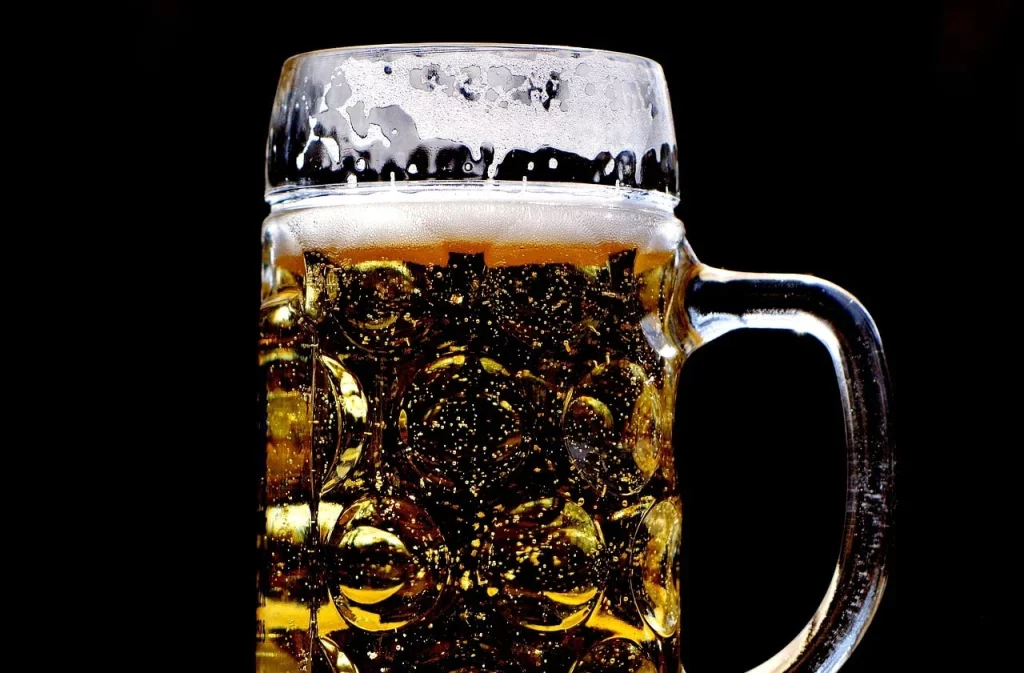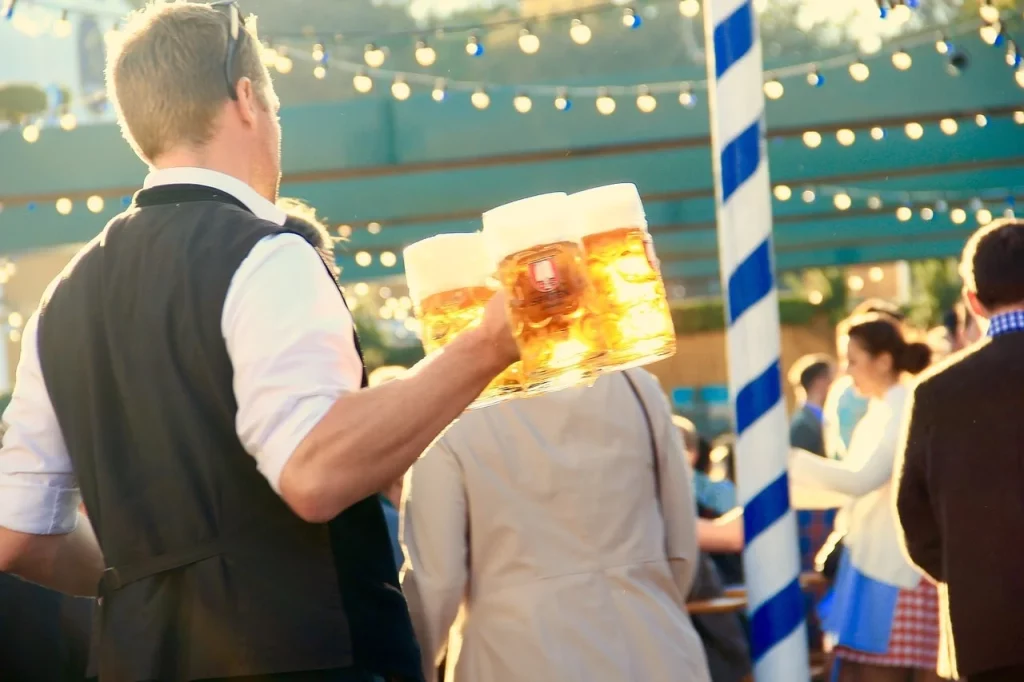Welcome to the world of lederhosen, pretzels, and, most importantly, beer – this is Oktoberfest! A festival so grand that it makes your local county fair look like a backyard barbecue.
Each year, millions of people gather in Munich for a celebration that’s been brewing since 1810. From the clink of steins to the sound of oompah bands, Oktoberfest is a carnival of Bavarian culture.
Did you know that Oktoberfest actually begins in September? That’s right, the Germans start their party fashionably early! So, grab your dirndl or lederhosen, and let’s dive into some fascinating facts about this beer-soaked extravaganza. Ready to find out why Oktoberfest is the king of all folk festivals?
Oktoberfest is a heartwarming festival where beer unites the world.
Angela Merkel
Oktoberfest Facts
Let’s start our journey through the vibrant world of Oktoberfest. Keep in mind that I created a quiz at the end of the article to test your expertise on this festive tradition. Read carefully, and don’t disappoint me.
- The inaugural Oktoberfest in 1810 was a commemoration of Bavarian Crown Prince Ludwig’s marriage to Princess Therese on October 12th.
- Initially, Oktoberfest began as a horse racing event to honor the royal nuptials.
- Located in Munich, Germany, Oktoberfest occurs on Theresienwiese, a spacious field.
- Traditionally, the festival kicks off in September and concludes on the first Sunday in October.
- Due to the COVID-19 pandemic, Oktoberfest 2020 was not held, a first since the Second World War.
- Attendees typically consume over 7 million liters of beer during the event.
- Oktoberfest features only beer that adheres to the Reinheitsgebot and is brewed within Munich’s limits.
- Oktoberfestbier, a special variety of beer, is served at the festival and contains about 6% alcohol.
- The biggest tent at Oktoberfest can accommodate 10,000 guests.
- Oktoberfest annually generates around 12,000 job opportunities.
- About 4,000 items are found each year in the festival’s lost and found.
- Traditional dishes include Weißwurst (a type of sausage), Hendl (roasted chicken), and pretzels.
- Oktoberfest has its own dedicated postal service and a police station.

- This festival is a key aspect of Bavarian tradition, with its origins dating back over two centuries.
- The festivity begins with a 12-gun salute and the Munich Mayor tapping the first keg.
- More than 6 million people attend Oktoberfest each year.
- The festival was moved to September for better weather conditions.
- Horse racing, part of the original celebration, last occurred in 1960.
- Men wear Lederhosen, and women don Dirndl, traditional Bavarian clothing.
- The decorations at Oktoberfest feature Bavaria’s blue and white colors.
- Since 1950, Oktoberfest has officially started with the “O’zapft is!” exclamation.
- The festival includes a traditional rifleman’s parade.
- Munich’s breweries sponsor the large beer tents.
- Discounted prices for rides and games are available on family days.
- Oktoberfest features a variety of funfair rides and games.
- The first mechanical rides were introduced in 1880.
- Modern Oktoberfest places significant emphasis on environmental conservation and waste management.
- The festival significantly boosts Munich’s economic, tourism, and entertainment sectors.

- The “Italian Weekend” attracts numerous visitors from Italy.
- “Gay Days” is a well-known event during the festival.
- In 2010, historical reenactments and horse races were reintroduced for the bicentennial celebration.
- The festival site is commonly known as “Wiesn“, short for Theresienwiese.
- A unique Oktoberfest beer is brewed specifically for the festival.
- The oldest beer tent, Schottenhamel, has been part of Oktoberfest since 1867.
- The Wiesn church service gathers Oktoberfest workers and attendees for a religious ceremony.
- Oktoberfest has inspired comparable festivals globally, including in the USA, Canada, and Brazil.
- Originally, Oktoberfest concluded with a horse race in front of the Royal Family.
- Beer prices at Oktoberfest are noticeably higher than Munich’s average beer prices.

- A smoking ban was implemented in all tents in 2005.
- The phrase “Wiesn G’schau” refers to the tradition of dressing up for Oktoberfest.
- A Victorian village with historical attractions is a recent addition to the festival.
- Some tents offer entry passes due to their popularity.
- Oktoberfest’s original location, once on Munich’s outskirts, is now part of the city.
- Oktoberfest has expanded its food offerings to include vegetarian and vegan options.
- Personalized beer steins are popular souvenirs, often engraved with names and dates.
- Local children in Munich partake in a traditional costume and riflemen’s parade.
- Recent years have seen increased security measures at Oktoberfest.
- A smaller version of Oktoberfest, known as “Oide Wiesn”, celebrates Bavarian heritage.
- Oktoberfest’s economic influence extends to Munich’s hotels, restaurants, and stores.
- Decorative “Lebkuchenherzen” (gingerbread hearts) are favored gifts and souvenirs.
Oktoberfest Myths

I hope you enjoyed reading all these fun facts about Oktoberfest. Now it’s time to clear up some common misconceptions about this festival. Let’s uncover the actual truth behind some myths.
- Oktoberfest is Mainly About Beer
While beer is a significant part of the festival, Oktoberfest originally started as a wedding celebration for Bavarian royalty in 1810. Over time, it evolved into a larger folk festival featuring music, parades, traditional foods, and amusement rides, in addition to beer. - Oktoberfest Occurs Only in October
Contrary to its name, it primarily takes place in September. It usually starts on the third weekend of September and ends on the first Sunday of October. This timing was chosen to take advantage of better weather conditions. - Only German Beers are Served
It is widely believed that Oktoberfest features international beers. However, only beers brewed within Munich’s city limits, conforming to the strict “Reinheitsgebot” (German Beer Purity Law), are served at the festival. - Lederhosen and Dirndls are Worn as Costumes
Many think of Lederhosen and Dirndls as costumes for Oktoberfest, but they are traditional Bavarian garments. These outfits are worn with pride by locals and have a rich cultural significance, transcending just being festival attire. - Oktoberfest is an Adults-Only Event
Although beer and revelry are prominent, it is a family-friendly event. The festival includes many activities for children, such as fairground rides, games, and specific family days offering reduced prices and quieter atmospheres.
No products found.
Oktoberfest Quotes

As autumn arrives, so does the vibrant spirit of Oktoberfest. In this section, I will share with you my favorite quotes that capture the essence of this world-famous festival.
In Munich, the air at Oktoberfest is thick with the aroma of camaraderie.
Ludwig Maximilian
Ludwig Maximilian, a professor from the Ludwig Maximilian University of Munich, describes the unique atmosphere of Oktoberfest, emphasizing the sense of community it fosters.
Oktoberfest: where tradition and celebration meet in a dance of joy.
Franz Beckenbauer
Franz Beckenbauer, a celebrated German footballer, captures the essence of Oktoberfest as a blend of German tradition and festive celebration.
Oktoberfest is not just about beer, it’s a cultural mosaic.
Johann Wolfgang von Goethe
Johann Wolfgang von Goethe, the famed German writer, offers a broader view of Oktoberfest, recognizing it as a cultural phenomenon beyond just beer.
At Oktoberfest, every toast is a story of heritage and friendship.
German Cultural Attaché
A German Cultural Attaché beautifully sums up the Oktoberfest experience as an occasion that celebrates both heritage and the bonds of friendship.
Oktoberfest is the epitome of Bavarian culture, distilled into one joyful festival.
Bavarian Minister of Culture
The Bavarian Minister of Culture encapsulates Oktoberfest as the ultimate representation of Bavarian culture, marked by joy and festivity.
Oktoberfest FAQ

The quiz is just ahead in the next section, but before that, let’s see together the answers to the most common questions asked about it online.
- Why is Oktoberfest not in October?
Surprisingly, Oktoberfest predominantly takes place in September! The tradition dates back to 1810, to the marriage of Crown Prince Ludwig of Bavaria and Princess Therese. The festivities began in October but were shifted earlier to September to allow for better weather conditions, making it more enjoyable for attendees to partake in the outdoor celebrations. - Who started Oktoberfest?
It was started by the Bavarian royalty. It began with the wedding celebration of Crown Prince Ludwig of Bavaria and Princess Therese of Saxe-Hildburghausen on October 12, 1810. The citizens of Munich were invited to join the festivities, and this celebration set the precedent for the annual Oktoberfest tradition. - What traditional foods are associated with Oktoberfest?
It is a haven for food lovers, especially those who enjoy German cuisine. Traditional foods include Hendl (roast chicken), Schweinshaxe (grilled ham hock), Würstl (sausages), Brezn (pretzels), Knödel (potato or bread dumplings), Käsespätzle (cheese noodles), and, of course, a variety of German pastries. - What types of beer are served at Oktoberfest?
Oktoberfest is famous for its beer, served in large one-liter mugs. The beer at Oktoberfest, known as Märzen, is a rich, full-bodied lager traditionally brewed in March and allowed to ferment slowly during the summer months. Only beers conforming to the Reinheitsgebot (German Beer Purity Law) and brewed within the city limits of Munich qualify as Oktoberfest beer. - Are there any traditional events or activities at Oktoberfest?
Yes, Oktoberfest isn’t just about beer and food; it’s also filled with various traditional events and activities. Highlights include the Opening Day Parade, which features horse teams and floats, traditional Bavarian music and dance, the strongman competitions, and the famous stein-holding contests. For families, there are also fairground rides and games.
No products found.
Oktoberfest Trivia

Buckle up for the ultimate Oktoberfest quiz! Answer correctly, or you’ll be singing Bavarian folk songs in your dreams tonight!
Conclusion
In the end, Oktoberfest is more than a festival; it’s a vibrant, living bridge connecting us to history, tradition, and each other. Each stein raised, each dance step taken, and each laugh shared under the festival tents is a testament to the enduring power of human connection.
Oktoberfest’s enduring popularity reminds us to savor the moment and celebrate life’s simple pleasures. How does Oktoberfest inspire you to appreciate the cultural festivities in your own community? Do you feel a renewed sense of connection to traditions from around the world?
And as always, a funny question for you to finish this journey: If you were to create an Oktoberfest-themed superhero, would their superpower be unlimited beer brewing or the ability to dance any folk dance flawlessly? Let me know in the comments.
4 Sources Used For This ArticleBavaria and Oktoberfest Adventure Guide – Whoa Travel
History Of The German Oktoberfest – Oktoberfest Miami
Oktoberfest history – Oktoberfest Information


